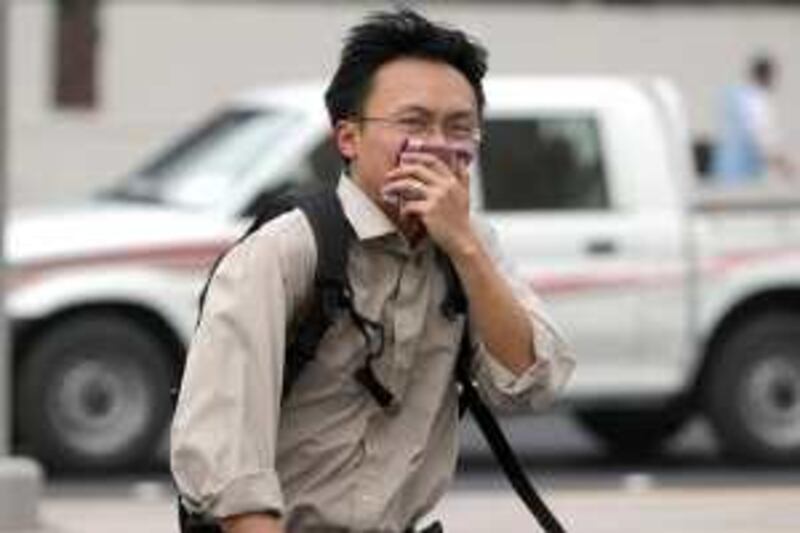ABU DHABI // Doctors are reporting an increase in the number of patients suffering from respiratory and eye problems as a haze of dust continues to shroud the UAE. One of the country's leading medical experts on respiratory illnesses yesterday advised patients with severe breathing problems to avoid going outside, warning that the dust could aggravate their symptoms.
Dr Bassam Mahboub, the vice president of the UAE Respiratory Society, said roughly 15 per cent of the UAE's 4.8 million residents suffered from asthma. The current hazy conditions from recent dust storms would make it even more difficult for some people to catch their breath, he added. Asked if the dust would inflame the chronic airways disorder, Dr Mahboub said: "Absolutely. I've been seeing more and more patients in my clinic because of this weather. For those people who have severe asthma or allergies or diseases, they probably should try to remain indoors."
Al Mafraq Hospital in Abu Dhabi reported a surge in patients admitted to the emergency room with problems caused by the dust. "Yes, we have had an increase," said Dr Anwar Sallam, the acting medical director of the hospital. "These have mainly been patients with respiratory problems, particularly people with asthma." He said asthmatics should avoid spending time outside whenever possible until the dust cleared. If they must go outside, they should carry inhalers. "If a labourer has asthma, he should try and get a doctor's note signing him off work," Dr Sallam added.
According to the Middle East-Asia Allergy Asthma Immunology Congress, allergies can cost the Middle East and North Africa region more than US$2.5 billion (Dh9.1bn) annually in medical costs, time off work and lost productivity. Dr Sallam said poor air quality was the second most common trigger for asthma attacks in children, with the common cold being number one. Dr Nihanth, a general practitioner who was the attending physician in the emergency department of Abu Dhabi's NMC Hospital in the past two days, said face masks would help to a degree.
"Wearing some masks will help prevent asthma, because this sort of dust is an aggravating factor in asthma attacks," he said. It is not only people with breathing problems who have been suffering. Eye-care specialists in Dubai said they were seeing more patients with dry, irritated eyes and complaints of conjunctivitis. Sandstorms were often to blame, said Dr Edmondo Borasio, a corneal specialist with the Moorfields Eye Hospital in Dubai.
"Definitely when you have the sandstorms, you can have the increase in this type of benign conjunctivitis," he said. "I also feel like I have 'foreign body sensation' in the eyes," he added, referring to the feeling of having a large speck of dust scratching the cornea. The sensation was usually due to the eyes being dry. "We've been seeing quite a few more patients coming in the past week, very likely related to the sandstorms."
Small dust particles blowing through the air could get lodged in people's eyes, causing conjunctivitis. Eye drops usually alleviated the problem. "Dust does increase the number of conjunctivitis cases," said Dr Benham Yahmai, an opthamologist at Health Care Medical Centre. "This usually happens because of the wind and small particles like sand being exposed to the eye." He advised people concerned about their eyes to keep them well lubricated with drops or wear sunglasses to protect them.
The dusty weather and poor visibility forced the Abu Dhabi National Oil Company to halt crude exports from its Jebel Dhanna terminal over the weekend, according to reports. The export terminal remained closed yesterday due to bad weather, which also scuppered some residents' holiday plans. "I have a month's vacation now and my vacation is ruined," said Waleed al Madani, a student at UAE University. "The sandstorm has made it worse."
Mr al Madani, who has lived in the UAE all his life, said although he was used to the storms they were still a major inconvenience. "I cleaned my car yesterday but now I'm going to have to clean it again," he said. Rachel Morley, 34, from the UK, blamed the dusty conditions for keeping her indoors for most of her weekend. "We haven't seen a storm like this for some time," said the property agent, who has lived in Abu Dhabi for four years. "I've not been out so much because of it."
Oly Sakr, 39, a Lebanese property developer, was resigned to the fact that the lifestyle comes with the territory. "It's annoying to your eyes, but what can I do?" she said. "That's the country. It's full of desert and sand." @Email:mkwong@thenational.ae * With additional reporting by Hala Khalaf, Kathryn Lewis and Reuters





